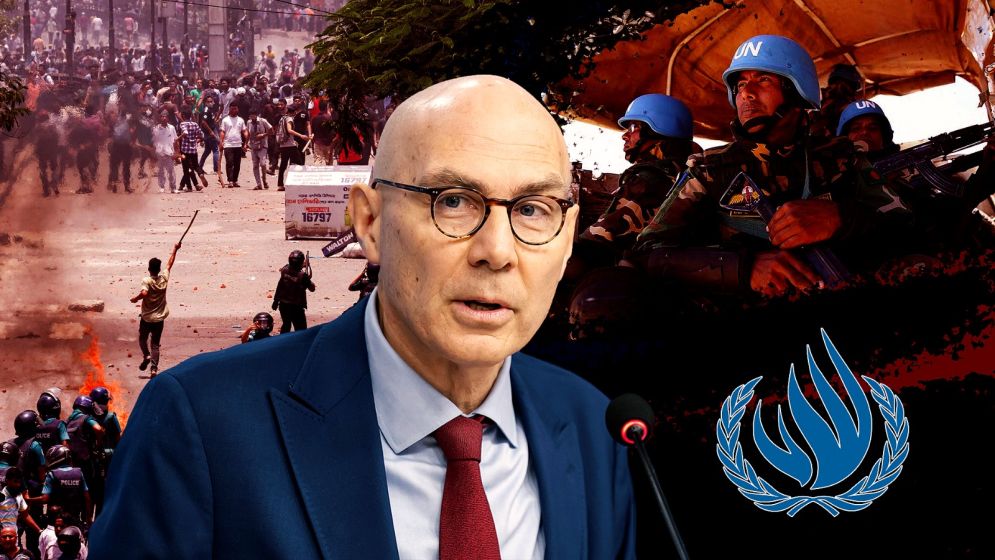UN Rights Chief's “warning” on Bangladesh Army's peacekeeping prospect during July uprising calls for deeper scrutiny…. and insight
Dr Mohammad Zahidul Islam Khan
Publish: 12 Mar 2025, 02:24 PM

The recent press release by Bangladesh’s Inter-Services Public Relations (ISPR) challenging the comments made by UN Commissioner for Human Rights Volker Türk regarding his actions during Bangladesh's July-August unrest carries with it significant geopolitical and historical weight.
It calls for an impartial and thorough investigation into the truth behind the events in question.
Yet, this crucial statement would likely have had a greater impact on the national interest if it had come directly from the government—preferably from the Ministry of Foreign Affairs or its official press office.
The statement, while important, underscores a glaring absence of the strategic foresight, diplomacy, and coordinated effort necessary to safeguard national interests—particularly the tangible and intangible benefits of peacekeeping that have been integral to Bangladesh's state-building and civil-military relations.
The controversy erupted after Volker Türk, in a 23-minute interview for the BBC’s Hard Talk, was asked about his tenure at the UN and his views on the Human Rights Council.
In his response, Türk referenced Bangladesh's 2022 protests, stating that during the July-August demonstrations, "there was a massive demonstration of students" against Sheikh Hasina's government.
Türk went on to claim that he had communicated directly with the Bangladesh Army, warning them of the consequences if they were to engage in repression during the protests, including the potential loss of their peacekeeping role within the United Nations.
This assertion, notably, implied that Volker had personally "warned" the Bangladesh military, a claim that has now been firmly denied by the ISPR.
The ISPR press release, in its defense, refuted the claim, arguing that any such concerns would have been raised with the then-government of Bangladesh, not with the military directly.
Indeed, Volker did not specify the recipients of his warning, leaving open the possibility for confusion and contention over the accuracy of his version of events.
This ambiguity makes the ISPR's account seem more plausible, as it adheres to the accepted protocol whereby high-ranking UN officials engage with the governments of troop-contributing countries, not their military leadership, on such sensitive matters.
In this context, the response from the ISPR, while a necessary corrective to the public record, would have carried far more weight had it come from a governmental source with the full authority to address the broader implications of this dispute.
The statement, while not without merit, highlights a missed opportunity for Bangladesh’s foreign policy apparatus to act with the requisite wisdom and diplomatic finesse that would better serve national interests and uphold the integrity of its civil-military relationship.
The absence of such an official response at a governmental level risks further complicating the situation, undermining the carefully cultivated international partnerships that have long been a cornerstone of Bangladesh's role in global peacekeeping.

A geopolitical and human
rights miscalculation
Volker Türk’s comments regarding Bangladesh’s peacekeeping contributions also reveal a fundamental misunderstanding of the country’s political and military dynamics.
First, Volker appears to assume that (i) the Bangladesh Army, rather than the civilian government, has the authority to decide on troop deployments for peacekeeping operations; and (ii) that only the army—not the government—would bear the brunt of consequences if the UN were to exclude Bangladesh from peacekeeping missions.
The ISPR’s response seems to take advantage of this assumption, emphasizing that the lion’s share of the financial benefits—amounting to approximately 270 billion taka over 23 years—has significantly contributed to the national economy, while only a small portion of that sum is directed to the soldiers themselves.
By focusing solely on the army, Volker’s warning appears to overlook the broader, intangible benefits of peacekeeping, including Bangladesh’s international reputation as a proponent of peace and the normative power it gains by participating in such missions.
These intangible rewards, tied to the sacrifices and hard work of Bangladeshi peacekeepers in some of the world’s most challenging environments, are enjoyed not just by the military, but by the civilian government, foreign ministries, and Bangladesh’s diplomats representing the country in various UN bodies, particularly the Department of Peace Operations (DPKO).
Secondly, Volker’s omission of the Bangladesh Police from his narrative is notable.
The police, a key component of Bangladesh’s peacekeeping force, were actively engaged in the very human rights violations Volker claims to protect.
If Volker indeed communicated with the military, ostensibly using coercive diplomacy to ensure compliance with human rights norms, it would stand to reason that he should have also engaged with the police earlier—especially to prevent loss of life.
Given the civilian leadership overseeing the police force, this oversight seems not only a missed opportunity for intervention but also an indication of a lack of contextual understanding.
Such an omission could unintentionally exacerbate an already fragile civil-military relationship, particularly in the context of Bangladesh’s ongoing internal challenges.
Finally, from a geopolitical and global governance perspective, Volker’s actions during the Bangladesh uprising can be viewed as a classic case of trying to enforce international human rights norms from a distance.
By leveraging the "teeth" of the UN Human Rights Council, which he chairs, Volker aimed to pressure a state accused of human rights violations into compliance.
This approach, while well-intentioned, aligns with the theory of "governance from a distance" as described by scholars like Thomas Risse, Stephen C. Ropp, and Kathryn Sikkink in their work The Persistent Power of Human Rights.
They argue that while international institutions like the UN can play a crucial role in enforcing human rights norms, such external pressure can sometimes lead to overly optimistic assessments of a state’s capacity to manage the transition and uphold human rights post-crisis.
In Bangladesh’s case, this has contributed to a weakening of national unity, highlighting the limitations of external intervention in ensuring long-term compliance with human rights standards.

A call for strategic
diplomacy in Bangladesh’s crisis
Imagine a counterfactual scenario: Wouldn’t it have been more effective for Volker Türk to “warn” Bangladesh’s deposed Prime Minister about the potential consequences of facing trial at the International Court of Justice (ICJ), should she fail to order security forces, including the army, to refrain from firing on unarmed civilians?
This is the very path that UNHRC reports suggest is now a possibility. Rather than coercing and "warning" the army (or the police), a more strategically crafted warning directed at the civilian leadership would have been not only more effective but also in line with the principles of civilian control over the military.
Until more details of the UNHRC’s communications with Bangladeshi officials are made public, the prevailing wisdom suggests that Volker’s coercive diplomacy and his reported communication with the army lack strategic depth and collective wisdom.
It is in these circumstances that Volker’s selective engagement – contested by the ISPR – and the apparent lack of strategic insight shown in his interview will likely remain subjects of scrutiny by researchers and analysts.
The personalized attribution, limited engagement, and narrow strategic outlook in Volker’s statement, along with the interim government’s choice to avoid issuing any official response through the Ministry of Foreign Affairs or the press wing, provide important lessons for both sides.
For the UNHRC, Volker’s handling of Bangladesh should serve as a cautionary example of how not to make personalized, potentially inaccurate statements that can be easily contested.
Coercing a troop-contributing country (TCC) into compliance with international human rights norms, particularly in a contentious environment, requires engaging with the highest leadership – those with command over all security forces, including the police, and those who stand to lose the most, such as facing prosecution through the ICJ, as Volker mentioned in his interview.
For the Bangladesh government, the failure to issue an official statement through the Ministry of Foreign Affairs or the Press Wing signals a breakdown in teamwork at a critical moment.
By leaving the army to respond to Volker’s statement, the interim government has inadvertently opened a rift in the already strained civil-military relationship. This omission highlights a missed opportunity for coordinated diplomacy at a time when it is most needed.
Volker’s decision to engage with the army rather than the civilian leadership may reflect not only weak leadership on the part of the UNHRC but also Bangladesh’s vulnerability to being governed from a distance, caught in a state of limited sovereignty.
This situation represents a new reality that political scientists and geopolitical experts, particularly those focusing on smaller countries, must address to find a sustainable solution.
In the rare pursuit of truth, an ancient quote from Aristotle resonates: “Plato is dear to me, but dearer still is the truth.”
This wisdom should inspire officials in Geneva and Dhaka to prioritize transparency and the truth, guiding us toward a more informed and strategic approach to diplomacy.
—
Dr Mohammad Zahidul Islam Khan, a retired Group Captain of Bangladesh Air Force and Chevening scholar is a Visiting Research Fellow of the Department of Politics and International Relations, University of Reading, United Kingdom and the Registrar of the American International University-Bangladesh. He can be reached at zikhan@aiub.edu.
